7 Worst Shoes for Knee Pain, Podiatrists Say

When picking out footwear, you might only have fashion on the mind. Unfortunately what looks good doesn’t always feel good, and no one wants to deal with achy, cramped feet after a day of wearing the wrong shoes. But it’s not just your feet you need to worry about: Walking in ill-advised footwear can also affect your knees, and if you’re someone already dealing with discomfort, your shoes could make the situation that much worse. To keep you feeling comfortable, we consulted podiatrists and other health experts for their insight into the worst shoes for knee pain. Read on to learn what they recommend avoiding.
RELATED: I’m a Podiatrist and I’d Never Wear These 3 Pairs of Shoes.
How can your shoes affect knee pain?
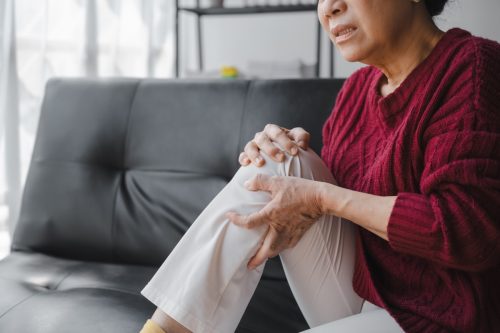
As you age, you might notice more discomfort in your knees.
“Knee pain is very common, especially for older individuals,” says Bruce Pinker, DPM, board-certified podiatrist and foot surgeon.
But one of the biggest factors contributing to knee pain is bad footwear.
“Shoes can affect knee pain by altering the foundation of the body, which translates into added stress in the lower extremities, such as the ankle, knee, and hip regions,” Pinker explains.
This can even lead to a number of long-term health consequences, including “arthritis, degenerative joint disease, pain, swelling, and difficulty walking, running, standing, and ambulating,” according to the podiatrist.
That’s why many experts recommend being more thoughtful about your footwear. Read on for the seven worst shoes for knee pain, according to podiatrists.
RELATED: 5 Best Shoes for Knee Pain, Podiatrists Say.
1
Flats
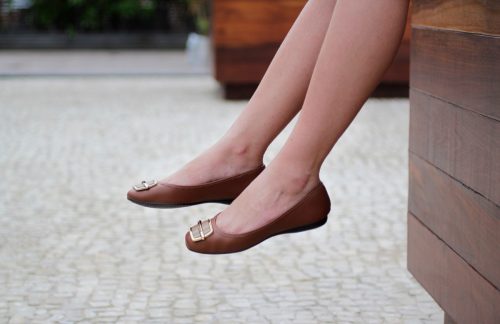
If you’re already dealing with knee pain, you need to go ahead and toss out any of the flats in your collection.
“Flats are not recommended for those suffering from knee pain, as the lack of general support, and lack of arch support, can lead to biomechanical concerns that can exacerbate the knees,” Pinker cautions.
RELATED: 5 “Comfortable” Shoes That Are Actually Bad for Your Feet, Podiatrists Say.
2
High heels
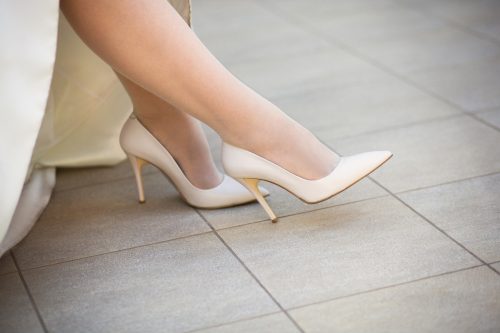
High heels can also be harmful to those with knee pain, because the “strain on the feet and altered foot positioning can lead to added strain on the knees,” according to Pinker.
Milica McDowell, PT, certified exercise physiologist and vice president of operations at Gait Happens, actually considers high heels the absolute worst kinds of shoes for knee pain.
“They put your foot into a plantarflexed (think ballerina point) position all day,” she shares. “This changes the posture stresses on the knee and doesn’t allow you to use your full knee range of motion and muscle control.”
3
Platform heels
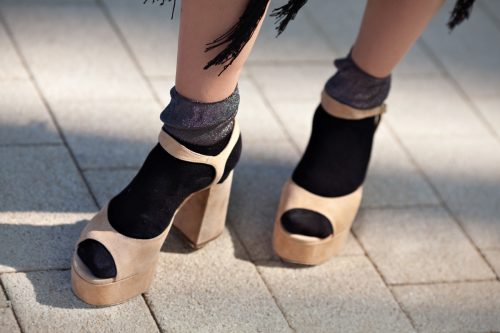
Don’t automatically assume that platform heels are much better just because they offer more stability.
“These are a close second to high heels as far as knee stresses go,” McDowell says. “They don’t allow you to roll from your heel to your toe (normal walking mechanics)—you just clump along with your whole foot contacting the ground at once.”
She continues, “This makes you lose a lot of the function of ankle range of motion and foot muscles (and the calf’s contribution to walking), so they shift excessive stress to the knee joint and surrounding muscles.”
4
Flip flops
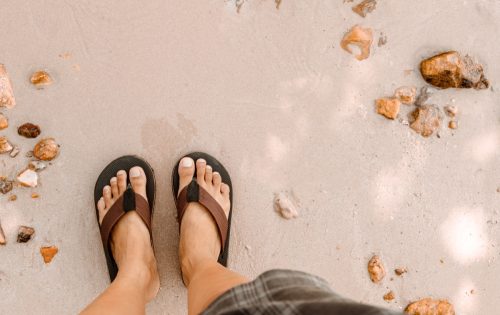
You might be ready to wear your favorite pair of flip flops all summer long, but doing so can make knee pain worse.
“Flip flops offer no arch support and can cause your foot to overpronate (roll inward), which then impacts your knees,” says Robert McLaughlin II, MD, board-certified orthopedic surgeon.
McLaughlin notes that he’s also seen the lack of support from flip flops cause many of his patients to develop plantar fasciitis, “which is a painful inflammation of the thick band of tissue that runs across the bottom of your foot and connects your heel bone to your toes.”
RELATED: 5 Best Shoes for Plantar Fasciitis, Podiatrists Say.
5
Poorly-fitted athletic shoes
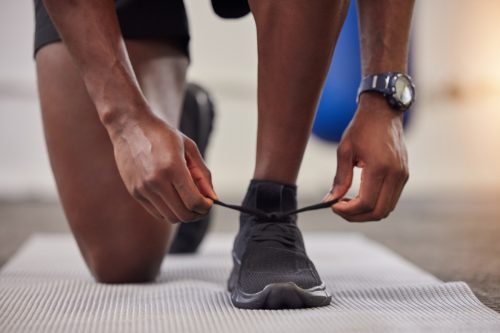
Even if you’re taking the time to stay fit and healthy through physical activity, the wrong footwear can create issues for your knees—not to mention other parts of your legs.
“Athletic shoes that don’t properly fit or support your feet can lead to injuries like shin splints and stress fractures,” McLaughlin warns, adding that he often treats these types of injuries in his practices.
“Proper athletic shoes should provide arch support and shock absorption to prevent damage from high-impact activities,” he advises.
6
Other shoes that don’t fit
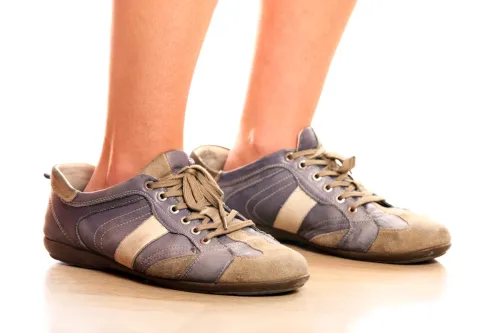
It’s not just athletic shoes you need to worry about when it comes to fit: Any shoes that are too small or too big are bad for knee pain.
“Scrunching up your toes to accommodate shoes that are too small overuses the tiny muscles in the arches of your foot and doesn’t let your ankle do its job,” McDowell explains. “Guess where that stress gets shifted? Yep, to the knee!”
On the other hand, if you’re wearing shoe that are too big (or too loose), you won’t have enough support, and this can lead to injuries as well, according to McLaughlin.
“I recommend my patients choose well-fitting, supportive shoes to maintain knee health and mobility,” he says.
7
Shoes without proper arch support
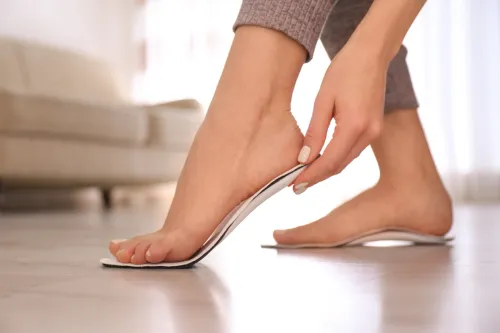
You should also consider the arch support you’re getting from your footwear. According to McDowell, “shoes that don’t adequately support the arch or are too rigid in the arch” can cause issues for your knees.
“The foot is designed to adapt to the walking surfaces, letting it be a big contributor to balanced gait (whether walking or running),” she says “If your inside arch (big toe side) of the shoe is either way too flexible, or way too stiff, it makes your foot function improperly. This will place additional stress on the knee, especially the kneecap tendon and the inside side of the knee joint.”